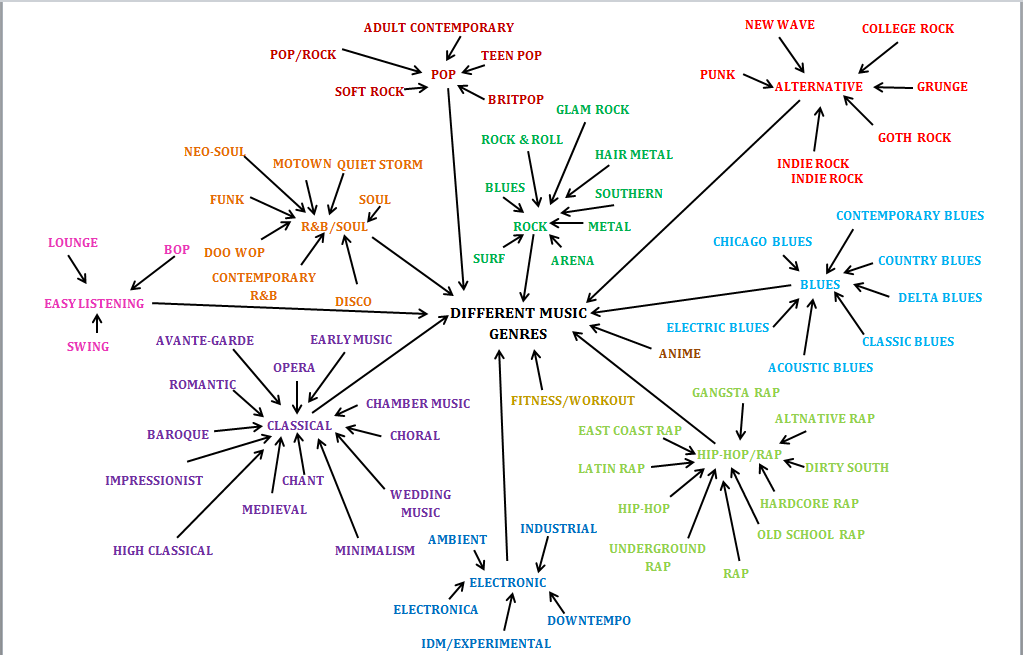Feedback: Are Musical Genres Meaningless?
April 7, 2015
 Courtesy of Click on English.
Courtesy of Click on English.
These days no one’s a philistine. You love a little bit of art some way or another unless you have literally lodged yourself under a rock. Even then I am sure some far-flung poem or portrait captures that subterranean experience so well you could make it yours and call it “rock-core.” In modern get-togethers folks munch on media as much as real food so you need as many words for the entertainment as the main course.
When you get to digesting, music’s the trickiest taste to describe. Even musical genre descriptions feel lackluster for anything outside of the widest swathe of sounds. In the world of books it’s easy to pin a lot of pieces down as anything from sci-fi to fantasy to classics to outright erotica. Painting feels almost bloated with terms so precise they come with dates.
Peel through a pile of records and you’ll wonder what the difference between “post-punk” and “post-pock” is. Is the term “pop punk” ironic or fitting or ironically fitting or fittingly ironic? At this point is “indie rock” any song where the band yells “Hey!” at the end of each line of the chorus? I have plumbed the shallow depths of my mind and my social circle for answers to all these questions only to come up more confused than ever. Even worse, a more sinister question lurks behind each query. Are musical genres meaningless? Do they still help us get at anything?
Sometimes genres spark an accurate image up pretty quickly. Though the difference between post-punk and post-rock can get a little tricky, at least the former is fairly well defined. Calling a band “post-rock” likely indicates their songs run for ten minutes, lack lyrics, and pack in overburdening amounts of noise. In other cases a genre works with such ease that it makes sense as soon as it’s heard, as with noise rock. Other genre names have such a cultural attachment that they’ll reach anyone, like metal, punk, or classic rock.
 Courtesy of Music Machinery.
Courtesy of Music Machinery.
Tossing aside all genres – trying to break every boundary with the zest of a new age motivational tape – throws a whole lot of baby out with the bathwater. Still, genre designations like indie rock or alternative or – God forbid – rock itself hardly do a damned thing. “Alternative” used to describe anything between The Killers and My Chemical Romance. Now “indie rock” does the same but for all acts in the endless space between the Decemberists and Arcade Fire. The worst offender, good ol’ rock n’ roll, covers everything under the sun involving a guitar and a drum.
Maybe the ticket’s to police it, carefully sorting the vague and opaque genres out from the telling and compelling ones. However that ignores how often the good turn bad. Indie rock has grown a long way from its roots and no one could foresee it becoming such a huge tree. Earlier “independent rock” meant music made on smaller, independent labels or produced by the bands themselves. At a time it had a counter-culture kind of leaning, small acts sticking it out despite no real commercial success. Now it’s Mumford and Sons and sound-alikes. Useful becomes useless in a hot minute, and vice versa, so sorting’s not so easy either.
Perhaps specification can save the day. We just need to dice up each genre into tiny subsections so we can identify every band, quick and technically. Electronic music and metal slice sound up into infinitely specific sub-genres, but doing so does not bring clarity. Instead of trying to figure out if a band is techno or metal at all, it places them properly in a landscape cluttered with often overlapping sub-genres. To make matters worse, the sub-genres only help if both parties already know the wider genre really well. Many times have the nuances of trip-hop, trance, jungle and drum n’ bass been explained to me. Many times have I forgotten them after failing to keep up with endless volumes of techno.
Conceivably there’s no solution and nobody needed one anyways. Music genre names might be plenty clunky but they can nail down a basic idea just fine. If they fail at even that, then conversation rolls on with an added talking point. If nothing else genres can be a really fun diversion. It’s another thing to talk in circles over, trying to refine how you and yours draw lines. It’s a clash over categories, a wrangling with words, a match against meaning, or – I don’t know – some other similar brand of nonsense.














